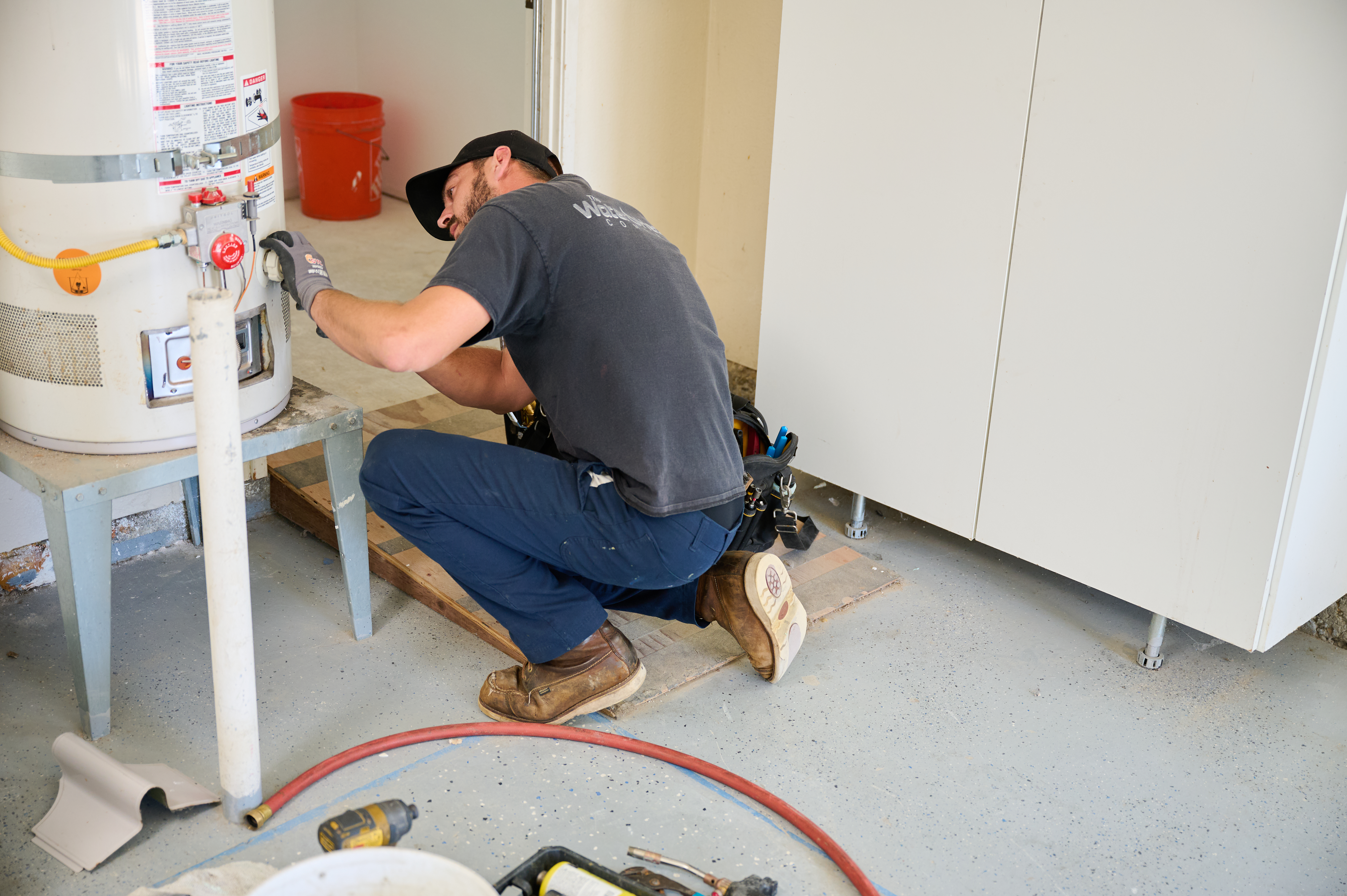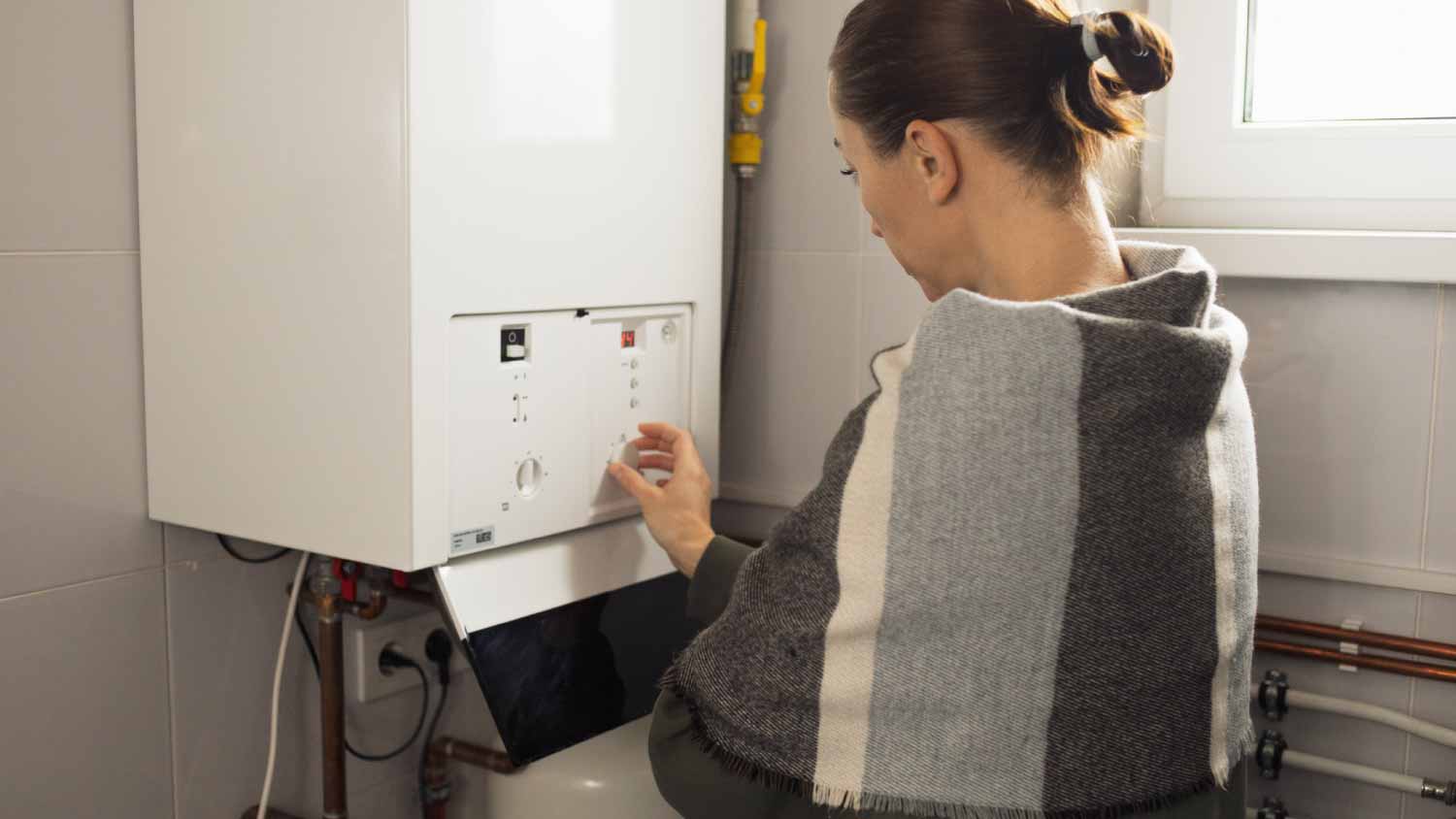
Running out of hot water too quickly? Use this water heater repair cost guide to see what a fix will cost in New York, NY.
Gas and electric water heaters have key differences you'll want to consider before making a purchase


Gas water heaters have lower operating costs than electric.
Electric water heaters are easier to maintain than gas.
Gas water heaters pose more safety risks than electric.
Gas water heaters' higher capacities and faster heating times make them ideal for large households.
Gas and electric are the main types of water heaters available, with key differences in terms of their operation, costs, and efficiency. Gas heaters heat water faster but may cost more to install, whereas electric water heaters have lower installation costs but may cost more to run. Understanding more about their pros and cons will help you decide which type of water heater is better for your home.
Gas and electric water heaters both supply hot water to your home. The gas variety provides the heat by burning fuel provided through a gas line, and the electric type generates the heat through electric resistance coils. However, there are plenty of other differences separating the two types.
Gas water heaters use natural gas or propane to heat water. They typically comprise a water tank, burners, and a heat exchanger that moves heat from the burner flame to the water. Once the water heats up, it's distributed through the home for washing or central heating.
| Pros | Cons |
|---|---|
| Heats quickly | Uses more space |
| Inexpensive to run | Gas leak safety risks |
| Works during power outages | Harder to install |
| High heating capacity | Requires gas hookups |
Best for:
Homes with large hot water needs
Homes that have access to inexpensive gas
Homes that have no shortage of space
The pros of gas heaters are many: low operating costs, hot water seemingly on demand, and their ability to operate during electricity outages. They’re particularly cost-effective in areas with high electricity prices.
However, gas water heaters also have some significant drawbacks. For one, gas is dangerous, and while rare, water heaters can leak dangerous gas. These heaters are much larger than their electrical counterparts and also harder to install, requiring proper venting and gas hookups.
Electric water heaters use electricity to heat water. They usually comprise a water tank and one or several electric resistance coils that sit directly in the tank. Once electricity passes through the coils, they heat up the water before it's distributed throughout the house.
| Pros | Cons |
|---|---|
| Easy installation | Slower heating times |
| Less safety concerns | Higher operating costs |
| More compact | Shuts off during blackouts |
| Lower maintenance and upfront costs | Less capacity for heating |
Best for:
Smaller homes with low hot water demands
Homes that put a premium on space
People who want peace of mind from a safety standpoint
Homes that want lower maintenance and installation costs
Electric water heaters are more modern than gas types and are easy and inexpensive to install. They don’t take up much space and cost less to maintain over their lifespan than their gas counterparts. They don’t require hookups to anything other than water and power, allowing for more flexibility when picking an installation location. They also don’t pose any gas-related safety risks.
If electricity is more expensive than gas, which is commonly the case, these heaters will cost more to run. Larger homes may want more hot water available than an electric heater can generate as they simply take longer to heat water than gas heaters. Finally, say goodbye to hot water during power outages unless you have a backup generator.
Gas and electric water heaters both have their own distinct advantages, but which is better will depend on the home they are being used in and what the user considers to be important.
Electric water heaters beat gas varieties when it comes to the installation process. Plus, they take up less space than a gas tank will. However, since electric work is required, it’s best to leave installation up to a professional.
Gas water heaters need a local water heater contractor to install them—dealing with gas lines and venting are significant safety concerns and not simple tasks.
If you haven’t had a gas water heater before, the installation process is even more complicated and expensive. It requires the running of a new gas line and the installation of proper venting. A straight swap may cost around $500 for the installation, but putting in a gas heater from scratch could end up costing you as much as $2,000. So unless you have a particular need, swapping out an electric system for a gas one isn’t recommended.
Typical gas and electric water heaters will run between $550 and $1,500, fully installed. Electric water heaters tend to be slightly less expensive, both for the unit and the labor—but only by $100 to $200. Heavy-duty units of either type can cost significantly more than $1,500 because of a higher unit cost and a more challenging installation.
It’s better to stick with one, as you’ll spend significantly more if you’re switching from electric to gas or vice versa. Converting to an electric water heater likely means you’ll need to hire a local electrician to upgrade the electric panel. Switching to gas could mean you need a plumber to install a gas line, costing between $260 and $820.
Although a gas water heater may be more expensive upfront than an electric water heater, gas units are generally more efficient and thus less expensive to run, leading to cost savings over time. However, keep in mind that operating costs can vary based on fluctuating electric and natural gas prices in your area.
Although gas water heaters may need more maintenance over the years, there isn’t a great deal of difference in terms of their longevity. A well-maintained gas unit should last at least 10 years, and you may get a couple more years out of your electric system.
Tankless water heater systems can last at least 20 years. So although there are higher upfront costs for the unit and installation, you could get considerably more use out of the system. This is worth considering when making a final decision.
Whichever system you opt for, it’s good practice to have an annual maintenance check to help ensure your tank lasts as long as possible.
This may be splitting hairs, as the difference isn't substantial, but gas units usually produce heat more quickly than their comparable electric counterparts. This means the amount of hot water the system can provide in a given period (the recovery rate) is typically more for gas systems. They also perform better in their first hour of use (first hour rating).
Gas water heating systems carry greater risks than electric ones. Gas leaks, or even explosions, are a possibility, and you might want to install carbon monoxide detectors for peace of mind.
You can reduce your bills by simply cutting back on water, but the type of water heater can also make a big difference in energy efficiency. Electric water heaters are the more environmentally friendly option. They’re more energy-efficient and can use renewable energy sources such as solar, wind, or hydroelectric.
Look for an energy factor (EF) rating. Selecting a higher EF rating means you’ll have a more energy-efficient unit. Certain units can be particularly energy-efficient, including electric heat pump and tankless systems.
Point-of-use (POU) water heaters, also called tankless water heater systems, are available in both electric and gas models. They’re more energy-efficient than standard tank-based systems, which continually heat your water. The average household can save up to 35% in energy costs by switching to tankless, meaning these point-of-use systems are well worth the cost for many families.
If you live in a region that experiences frequent power outages, a gas water heater is ideal since it can continue to heat water during an outage. However, some newer models use an electric starter, so if you're worried about outages, consider purchasing a gas water heater without an electric starter.
Electric water heaters are usually considerably smaller than gas units with a similar specification. This makes them a better choice if you have a small home or plan to install the unit in a tight space.
Electric water heaters are generally easier to maintain than gas water heaters, largely because they have fewer parts. Since gas water heaters rely on burning fuel, they have components that electric water heaters lack, such as gas valves, venting systems, and flame burners. More parts mean that there are more areas that can potentially malfunction or break down over time.
From average costs to expert advice, get all the answers you need to get your job done.

Running out of hot water too quickly? Use this water heater repair cost guide to see what a fix will cost in New York, NY.

Tankless water heater costs in New York, NY, depend on the size of your water heater, location, fuel type, and more. Keep reading to calculate your expenses.

A water heater flush costs $160 on average but can vary based on the unit size, type, labor, location, and more. Keep reading to learn how much you could pay.

How much do water heaters weigh? The answer depends on the type of water heater, its size, and several other factors. Read on to learn more.

Testing a water heater thermostat starts with shutting off the power and using a multimeter. Follow this guide on how to test your water heater thermostat.

How long does a gas water heater last? Most last eight to 12 years, though some can last up to 15 years with proper maintenance.